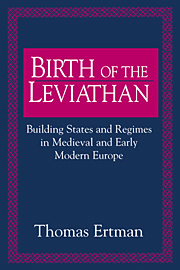Book contents
- Frontmatter
- Contents
- List of Tables
- Acknowledgments
- 1 INTRODUCTION
- 2 THE ORIGINS OF PATRIMONIAL ABSOLUTISM IN LATIN EUROPE
- 3 THE TRIUMPH OF PATRIMONIAL ABSOLUTISM AND THE FAILURE OF REFORM IN LATIN EUROPE, c. 1500–1789
- 4 BUREAUCRATIC CONSTITUTIONALISM IN BRITAIN
- 5 BUREAUCRATIC ABSOLUTISM IN GERMANY
- 6 THE TRIUMPH OF PATRIMONIAL CONSTITUTIONALISM IN HUNGARY AND POLAND AND ITS PREMATURE DEMISE IN SCANDINAVIA
- 7 CONCLUSION
- Bibliography
- Index
2 - THE ORIGINS OF PATRIMONIAL ABSOLUTISM IN LATIN EUROPE
Published online by Cambridge University Press: 12 March 2010
- Frontmatter
- Contents
- List of Tables
- Acknowledgments
- 1 INTRODUCTION
- 2 THE ORIGINS OF PATRIMONIAL ABSOLUTISM IN LATIN EUROPE
- 3 THE TRIUMPH OF PATRIMONIAL ABSOLUTISM AND THE FAILURE OF REFORM IN LATIN EUROPE, c. 1500–1789
- 4 BUREAUCRATIC CONSTITUTIONALISM IN BRITAIN
- 5 BUREAUCRATIC ABSOLUTISM IN GERMANY
- 6 THE TRIUMPH OF PATRIMONIAL CONSTITUTIONALISM IN HUNGARY AND POLAND AND ITS PREMATURE DEMISE IN SCANDINAVIA
- 7 CONCLUSION
- Bibliography
- Index
Summary
On the eve of the French Revolution, after over thirteen centuries of post-Roman statebuilding, two common features distinguished the polities of Latin Europe – an area comprising the southern Netherlands, France, and the Iberian and Italian peninsulas – from the other states of western Christendom. First, with the exception of Sicily and the three remaining Italian republics (Venice, Genoa, Lucca), all had long since dispensed with their national representative assemblies. In a word, this was the early modern West's most thoroughly absolutist area. At the same time, however, its rulers, while de jure enjoying quite extensive prerogative powers, had lost direct control over much of the administrative, judicial, and financial infrastructure of their realms to proprietary officeholders, officeholder-financiers, and tax farmers. Over the course of many centuries these groups had succeeded in appropriating substantial portions of their respective states' public powers for their own private ends. Thus Latin Europe was the homeland of an early modern state form that I have termed “patrimonial absolutism,” an ideal type most closely approximated by ancien régime France.
How is it possible to account for this common outcome to the long process of medieval and early modern political development among a group of countries which, after all, differed greatly in size, wealth, geographic position, and significance within the world of European power politics?
- Type
- Chapter
- Information
- Birth of the LeviathanBuilding States and Regimes in Medieval and Early Modern Europe, pp. 35 - 89Publisher: Cambridge University PressPrint publication year: 1997
- 1
- Cited by



